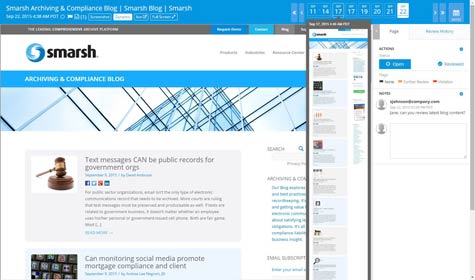As compliance regulations become more stringent, interest in archiving tools has steadily increased. The challenge now is that because so many types of data must be archived, the management of the archiving process is starting to spin out of control.
Looking to address that specific issue, Smarsh, a provider of a Web-based archiving service in the cloud, today added a supervision capability that makes it simpler to monitor and track changes in content and document reviews of archived Web pages as part of the extended archiving workflow.
Mike Pagani, senior director of product marketing and chief evangelist at Smarsh, says the company takes a comprehensive approach to archiving in that it stores over 40 different types of data in their native formats. The fact that data is stored inside a data center operated by Smarsh in Portland, Ore. means that recovering that data is not only simpler, but that IT organizations can easily search that data using the open source Solr search engine.
In addition, Pagani says that IT organizations can apply policies to archived data and even programmatically address that data using an application programming interface (API) that Smarsh exposes. Organizations can also opt to have archived data shipped to them on a DVD at any time. In fact, Pagani notes that Smarsh does not charge based on the amount of data stored, but rather based on the levels at which that data is regularly accessed.
Not too long ago, IT organizations would archive data and then pretty much forget about it. Now, organizations want more access to data for everything from Big Data analytics applications to court cases that require IT organizations to recover massive amounts of data that might be several years old. Cold data that was once stored away seemingly forever is now becoming increasingly active.
Archiving data may not be the most business critical of all the functions an IT organization needs to manage. But it is often one of the most time consuming. In that context, there’s a compelling case for using the cloud to make the archiving process as painless as possible.




